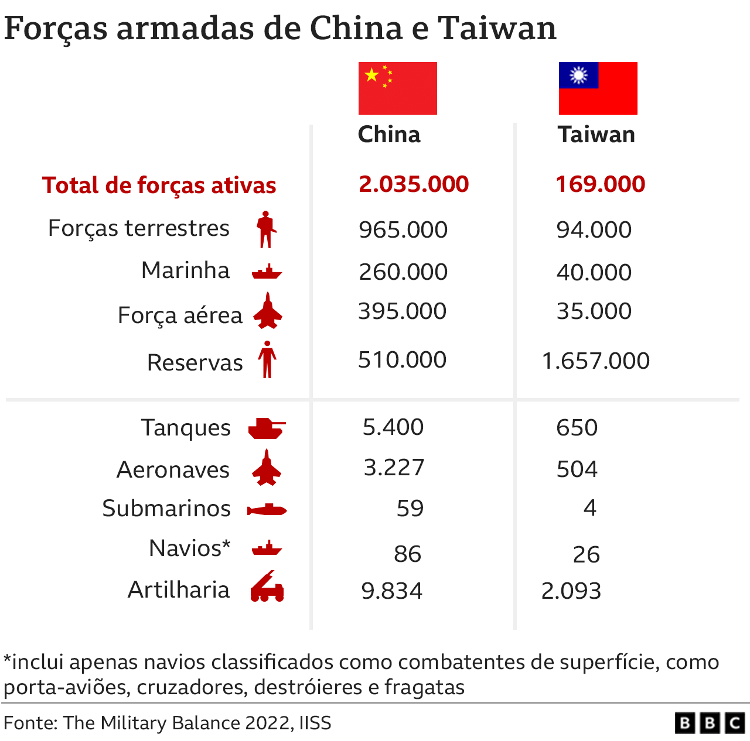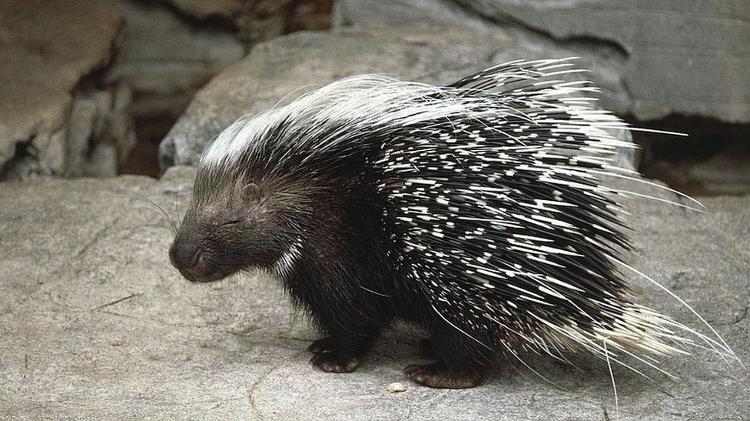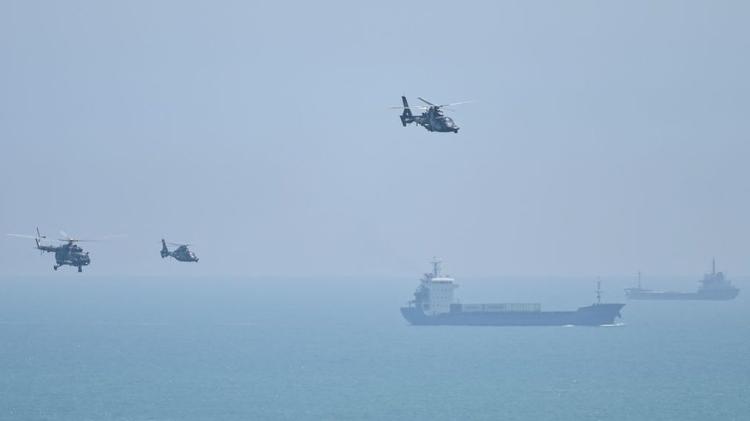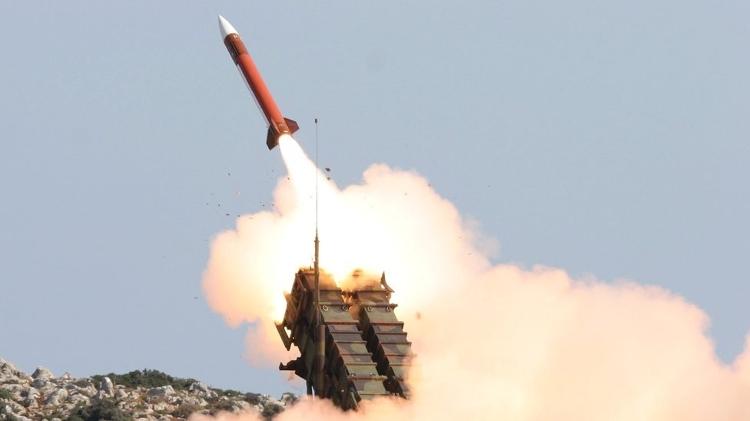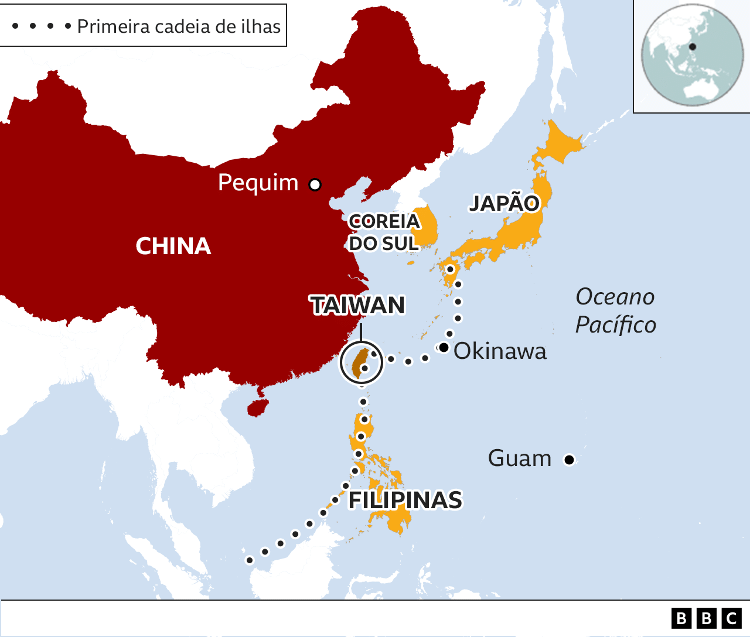China has an overwhelming military advantage over Taiwan, so the country bases its defense on the so-called “hedgehog” strategy.
China is conducting the largest military exercises in its history off the coast of Taiwan, an island it considers part of its territory.
Maneuvers launched by Beijing in response to a visit to the island by Speaker of the US House of Representatives Nancy Pelosi include launching missiles at sea and attacks on Taiwanese airspace.
Tensions between China and Taiwan have escalated so much over the decades that the possibility of an invasion of China by the powerful People’s Liberation Army is something few people overlook.
- Taiwan: How did China lose the island and what is the current status of the ‘Rebel Province’?
- Could the US and China go to war for Taiwan?
If China were to invade Taiwan, an asymmetrical war would ensue, that is, a conflict in which one side had a much larger military force than the enemy.
This is the kind of war we’ve seen between Russia and Ukraine, and it showed us that the imbalance of forces is not always repeated in the results on the ground.
Would it be much different if China invaded Taiwan?
Protect yourself like a hedgehog
China, with a population of 1.4 billion compared to Taiwan’s 24.5 million, has 13 times the defense budget of the neighboring island and also far outperforms it in troops, equipment and weapons.
Aware of its disadvantage in an asymmetrical war, Taiwan adopts the so-called “hedgehog strategy”.
When the hedgehog feels threatened, it releases its spines to deter stronger predators.
An editorial in the Taipei Times explains, “The pain of stepping on an animal’s spine becomes the main deterrent from crushing it.”
And if the predator still decides to attack the hedgehog, he will face a painful punishment and will eventually give up.
Taipei’s strategy is based on these assumptions and has been endorsed in the 2021 Four-Year Defense Review.
What this guide recommends is “Resist the enemy on the opposite shore, attack him at sea, destroy in the coastal area and destroy at the bridgehead”.
To face an asymmetrical war, Taiwan does not consider acquiring expensive fighters and submarines a priority, instead deploying mobile and stealth defensive weapons such as anti-aircraft and anti-ship missiles.
Three Layer Barb for China
Zeno Leoni, a specialist in international order, defense and Sino-Western relations at King’s College London, UK, analyzed the three layers that make up Taiwan’s hedgehog strategy.
“The outer layer is intelligence and reconnaissance to ensure the full preparation of defense forces,” he wrote in an article on Taiwan’s defense doctrine for the academic news site The Conversation.
Taiwan has developed an advanced early warning system for decades to avoid the surprise effect of a possible lightning strike from China.
Therefore, Beijing “would have to launch any invasion with an attack based on medium-range missiles and air strikes to eliminate Taiwan’s radar facilities, airstrips and missile batteries.”
According to the expert, the middle echelon of the hedgehog to respond to such an attack consists in the deployment of naval forces for guerrilla warfare at sea with the support of warplanes supplied by the United States.
Small, agile ships armed with missiles, supported by helicopters and land-based missile launchers, would try to prevent the Chinese Army fleet from reaching Taiwanese territory.
Or if he succeeded, he would pay a high price in human and material losses.
“Geography and population are the backbone of the third layer of defense,” explains Leoni.
Formosa’s complex terrain with steep mountains, few landing beaches, and much of its urbanized territory would have given the defenders an advantage and could have multiplied the casualties of the invaders.
Also, although the powerful Chinese army has 12 times more troops than Taiwan’s, the Taiwanese have more than 1.5 million reservists who will go to war if Chinese troops attempt to invade the country.
Mobile, versatile and easily concealed weapons will also be crucial in the third tier, as demonstrated in Ukraine with the Javelin and Stinger portable missile systems, a nightmare for Russian planes and tanks.
What would the US do?
And if China decides to invade Taiwan, will the United States go to war? Will they send soldiers or weapons? Do you take any other precautions?
The truth is we don’t know and the US doesn’t want us to know.
As Taipei perfects its hedgehog strategy, Washington clings to so-called “strategic uncertainty” in its dealings with China and Taiwan.
This means that the US deliberately concealed its plans of action should China invade Taiwan.
White House national security adviser Jake Sullivan recently said, “In a way, this uncertainty … has allowed us to maintain peace and stability in the Taiwan Strait and in various governments for several decades.” Said.
In May, US President Joe Biden surprised him by stating his country’s “commitment” to defend Taiwan, but later changed it, ensuring there was no change in “strategic uncertainty”.
This stance aims not only to deter China from invading Taiwan, but also to deter Taipei from declaring its independence (Beijing threatened to attack if it did) failing to secure US intervention.
Some US lawmakers have urged the country to shift towards “strategic clarity” to deter China, as the Asian giant increases its pressure on Taiwan and its military presence in the region.
In any case, few believe that the United States will stand idly by in the face of an invasion.
“You never tell your potential opponent what you plan to do. But I suspect that anything implemented in the first place to deter China and thwart an attempt to take over Taiwan won’t be just military,” Chris told the BBC. Parry, a strategy analyst at the North Atlantic Treaty Organization (NATO), a western military alliance.
“It would be something multidimensional, involving commercial, financial and informational approaches.”
‘We’ve been living like this for 70 years’
China’s military showdown is breaking the routine in Taiwan, where the mood is more anger than panic.
Ships docked and flights were canceled after Beijing restricted access to areas around the island for maneuvers.
– This text was published at https://www.bbc.com/portuguese/internacional-62421629.
Did you know that the BBC is also on Telegram? subscribe to the channel.
Have you watched our new videos on YouTube?? Subscribe to our channel!
source: Noticias
[author_name]
